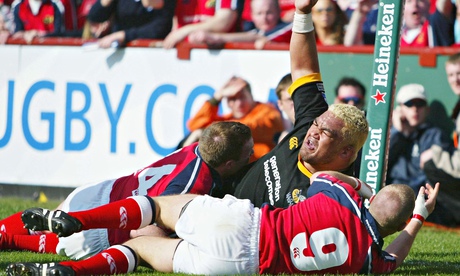
1 The name
In a refreshing (sorry) break with the norm, there has been only one name for this competition – for 19 years. Yes, in many ways, it is a pity that that name amounts to product placement, but at least the sponsor is a beer. And the consistency has given the competition a strong identity. Already, there are misgivings about the new version’s name, an obvious attempt to ape football’s equivalent, which is equally obviously not a competition exclusively for champions. Just wait until the announcement, probably over the summer. “Welcome to the first edition of the Simmons and Heslop Underwriters plc Rugby Champions Cup.” Repeat with a new name biennially …
2 The timing
The Heineken Cup started life on Halloween in 1995, which was a Tuesday. Toulouse travelled to the coast of the Black Sea to take on Farul Constanta of Romania. A couple of thousand men and a dog were watching. The IRB had just announced that rugby union was to turn professional, and the Heineken Cup was one of the first initiatives. That season, in keeping with the one-year moratorium that was set up before the start of professionalism proper, was a range finder, culminating in a final at the old National Stadium in Cardiff in front of 22,000. People took it more seriously the next year, as they did the idea of professionalism. If the latter has been deemed a good thing, it is the success of the former that has represented the jewel in its crown.
3 The rugby
And not just the rugby. The colour, the variety, the passion, the locations. And, of course, the drama. It has surely been the best rugby competition in the world. The World Cup is pretty good, but it is not so competitive. The Six Nations and Rugby Championship do not have the same degree of variety. Nor does Super Rugby, where there simply is not enough mud and mauling. Everyone au fait with the Heineken Cup can readily call to mind their own favourite memories of it, in a way they probably cannot for the Premiership or Top 14 or Pro 12. There are too many to list here. Special mention for the 2004 semi-final between Munster and Wasps in Dublin, but that is a personal opinion. You will all have your own.
4 The Irish
If the Heineken Cup grew side by side with professionalism, the Irish provinces grew with the Heineken Cup. In September 1998, for example, Munster entertained Neath at Musgrave Park in front of 1,500, which is fewer than turned up for that first game in Constanta. In December 1999, 3,000 watched Leinster take on Stade Français at Donnybrook. Now both routinely play to full houses, well into five figures and have won the title five times between them. It is true, as the English and French have long complained, that the Heineken Cup has best suited the Irish, but it is true too that the Irish have done more than anyone to make the Heineken Cup what it is today.
5 The minnows
Farewell, for now at least, to Zebre, Edinburgh, the Dragons, Connacht — even Cardiff, and who knows who else in the years to come. All right, so none is the greatest rugby team in the world (although let’s not forget Edinburgh were semi-finalists only two years ago), but their triumphs, which they all have enjoyed, are rendered the more dramatic and colourful for that. So too is the Heineken Cup. The spirit of the competition did once include a certain latitude for those clubs and unions not quite as powerful as the others. That included the Irish once, and now they are major players. The Italians and Scots might have followed in time. The Welsh are teetering all the more precariously with the advent of the new regime. It is still not obvious why we could not have stuck with 24 teams, but the new competition looks more streamlined and aggressive, more professional you might say. If professionalism gave birth to the Heineken Cup, the final irony is that it has done for it too.

